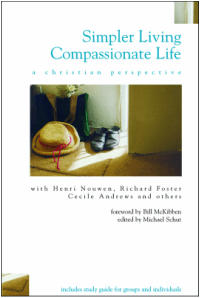To see a general overview of Simpler Living, Compassionate Life click here.
In this section (Theology in Support of Simplicity and Eco-Justice): “Some Notes from Belshaz’zar’s Feast” by Timothy Weiskel (161-174); “Creation’s Care and Keeping” by Calvin DeWitt (175-179); “The Discipline of Simplicity” by Richard J. Foster (180-190)
Each essay in this section looks to the Bible as a guide in response to the ecological crisis. Weiskel echos earlier sections that call out our idolatry to over-consumption and money. For those wanting an exclusively hopeful response to the environmental crisis, this article will be a disappointment. It honestly looks at the reality of our parasitic co-existence with the Earth and its inhabitants. It argues that the only way forward begins with a deconstruction of what we have always expected, so that we may build a new priority and understanding of our place in the world. It holds cautious hope, but also realizes that it might be too late.
DeWitt’s reflections provide a useful Biblical grounding. This may be especially beneficial for communities beginning their journey in creation care.
In the final article, simplicity is considered as a way of life that is both an inward and outward reality. It establishes the necessary connections between a state of mind and actions. It begins to close the circle of the arc of this book that began with the necessity of affirming the sacred nature of the experience of every living thing.
In my opinion, if you chose to only read one section of this book, pick this one. It captures the Biblical and faith inspired foundation of the movement toward simplicity and implicates those of us who are participants in a culture of over-consumption for the damage we’ve done to the gift we’ve been given.







